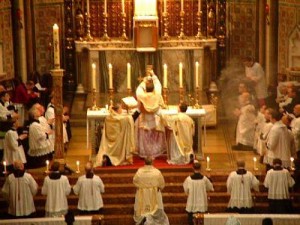 When the priest begins Mass in the Extraordinary Form, he does so by praying Psalm 42 (or 43, depending on your bible’s translation.) The priest asks for God to judge Him (and all present), and to distinguish his (and all of our) causes from that of the unjust.
When the priest begins Mass in the Extraordinary Form, he does so by praying Psalm 42 (or 43, depending on your bible’s translation.) The priest asks for God to judge Him (and all present), and to distinguish his (and all of our) causes from that of the unjust.
When we attempt to understand what this passage means, we must begin by eliminating any attempt at being self-referential. Some will see this as a priest asserting his and his congregations holiness before God. Yet such is a failed understanding of the Gospel.
What is God’s justice? Justice should not be looked at as some courtroom setting where we have two lawyers arguing a case and an impartial judge. While this is no doubt a part of justice, for the Christian it is different. We are judged by “the law of liberty.” (James 1:25) In the law of liberty, God’s justice is God’s favor. So when we pray for God’s justice, we are praying for God’s favor to descend upon us, His chosen people.
When you read the Psalm from this perspective, it all makes sense. God judges his people with his favor. He fights for their cause. He delivers them from the wicked. He provides man light and sets him upon the path of truth. Far from boasting, the entire prayer places all the action on God’s behalf.
How does this favor come to us? What can we do to merit God’s favor? Quite simply, the answer is nothing. There is nothing we can do to gain God’s favor. There’s nothing we can do that allows us to stand before God and say “this has happened, now give me your favor.” The only thing we can do is place our trust in God’s mercy. We can approach the altar penitent, admit we don’t deserve any of this, and only ask that God hears us.
When we look at the Bible (especially the Old Testament), we find this way of worship in its pages. In 2 Chronicles, God responds to Solomon by noting that when we are faced with evil, if we repent and turn to God, He will hear from heaven and heal us. He heals us through the sacrifice of the Cross.
In this opening prayer the Cross is already pointed to. It is through the Cross that man can receive through God’s favor. Through the Cross we are delivered, and only through the Cross do we find the path to eternal life.
Without this, we remain like the unholy. The unholy aren’t unholy because they are sinners. They are unholy because they have chosen the opposite of what we are doing in that prayer. Like them, we are also sinners. Yet unlike them, we’ve chosen to come to Church on that day. We could have chosen to go to the ballgame or the bar, or maybe just sit around in front of television. Or maybe we felt work was more important.
None of these things are bad. In many ways they can be quite good. Yet we aren’t setting ourselves apart by them. We set ourselves apart by coming to the heavenly liturgy, realizing that as good as all of those things are, they don’t have the answers we are seeking. Those answers can only be found on the altar of God.



